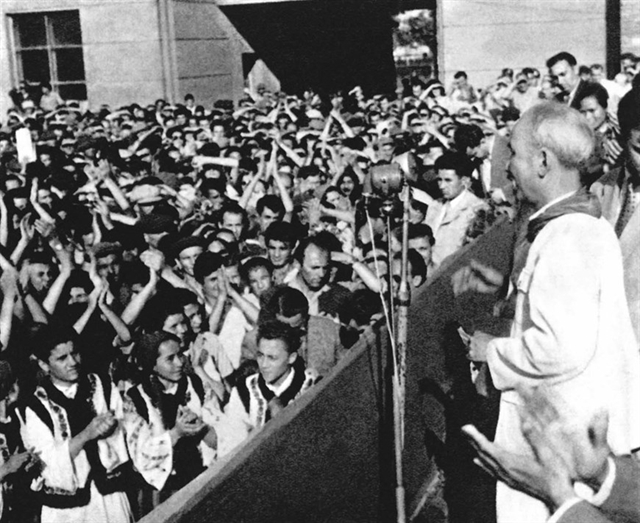 Politics & Law
Politics & Law

 |
| President Hồ Chí Minh talks to the workers at a tractor factory in Romania, July 1957. — VNA Archive Photo |
During his journey to seek the right revolutionary path for Việt Nam, President Hồ Chí Minh formed the thought on the issue of opening the doors and integration.
In an article published in the L’Humanite newspaper on August 2, 1919, he wrote that in terms of principles, common progress depended on the development of internationalism and civilisation could only be beneficial when international relations were expanded and enhanced.
After the success of the 1945 August Revolution, President Hồ Chí Minh attached importance to the expansion of international relations and sending of personnel to learn scientific and technical advances of other countries to serve socio-economic development.
In his letter sent to then-US Secretary of State James Byrnes on November 1, 1945, the Vietnamese leader put forth the initiative of building people-to-people diplomacy to start cooperative ties between the peoples of Việt Nam and the US.
His strategic thought on an open economy was mentioned most fully and clearly in the “Appeal to the United Nations” issued in December 1946. In this letter, he stated that with democratic countries, Việt Nam was ready to carry out the open door and cooperation policy in all fields:
a. Việt Nam would create favourable conditions for investment from foreign companies into all of its industries.
b. Việt Nam was ready to expand ports, airports and roads for international trade and transit.
c. Việt Nam accepted to take part in all international economic cooperation organisations under the leadership of the United Nations.
d. Việt Nam was ready to sign special security agreements and conventions related to the use of some of its naval and air force bases with naval and ground forces within the framework of the UN.
Throughout the revolution, those viewpoints reflected the President’s far-sighted vision.
Attracting external resources to bring into play internal strength
President Hồ Chí Minh steadfastly pursued the open-door policy to help maintain stability in the region and the world so that the Vietnamese people could live in peace and freedom and pursued economic integration into the world to receive assistance from international friends in order to have conditions for tapping into the country’s potential.
However, he also emphasised that internal strength must be the key and noted with great internal strength, diplomacy would be successful. “If the internal strength is a gong, diplomacy is the sound. Only when the gong is large, can the sound be big.”
The leader called on each Vietnamese citizen to strongly uphold the spirit of independence, self-reliance, standing on their own feet, and “exerting their own efforts to liberate themselves”. He said: “If a nation does not exert its own efforts but waits for help from others, it does not deserve independence.”
The President requested cadres work well with foreign experts, learn advanced experience from other countries, and properly preserve and use the machinery and commodities provided by other countries; stringently fight bureaucracy, wastefulness, and embezzlement; and gradually build a contingent of international economics personnel who have both revolutionary virtues and high professional capacity to easily cooperate with and learn from foreign entrepreneurs.
Nowadays, Việt Nam has built a foreign policy matching the domestic and international situations and also conforming to the principles based on President Hồ Chí Minh's ideology, serving as the basis for expanding external economic relations.
The 10th National Party Congress affirmed the policy of actively integrating into the world and properly handling the relationship between independence, self-reliance and international integration; and comprehensively, intensively, flexibly, and effectively integrating into the world for the sake of national interests with national independence, self-reliance, and sovereignty guaranteed.
Việt Nam’s foreign policy is targeted at firmly maintaining national sovereignty, independence, self-reliance, and the socialist-oriented development path; setting up friendly and equal relations with other nations, making use of the assistance and cooperation from people around the world for its national reform, development, and safeguarding; firmly maintaining regional and global peace and stability to focus on economic development; ensuring Việt Nam’s extensive integration into the global economy; and unceasingly improving the country’s position in the region and the world. — VNS




